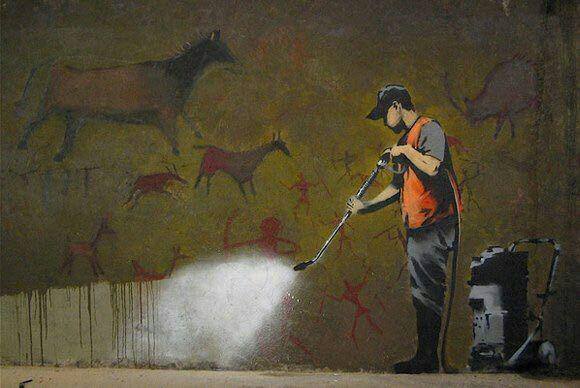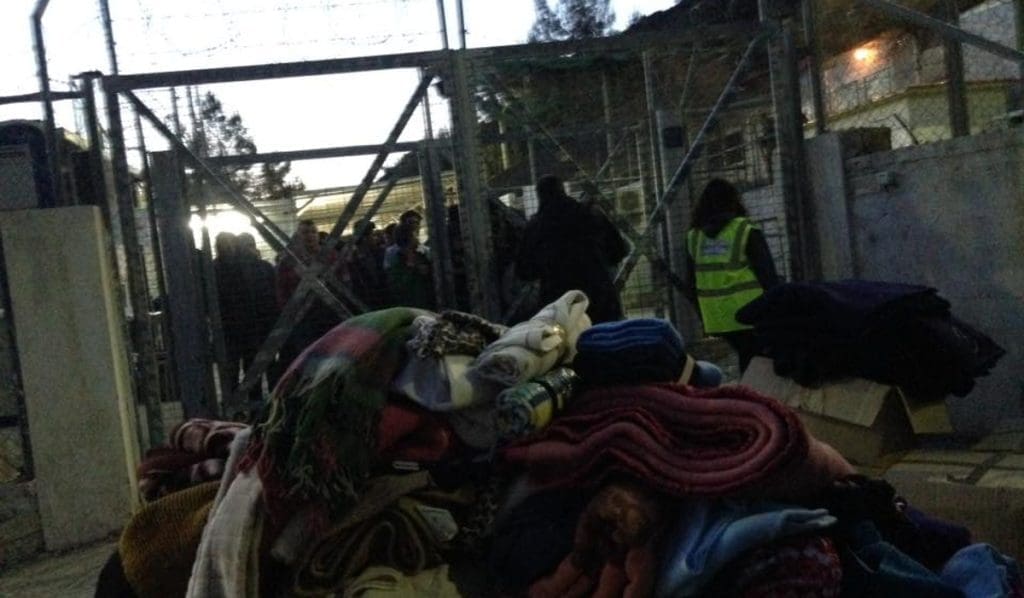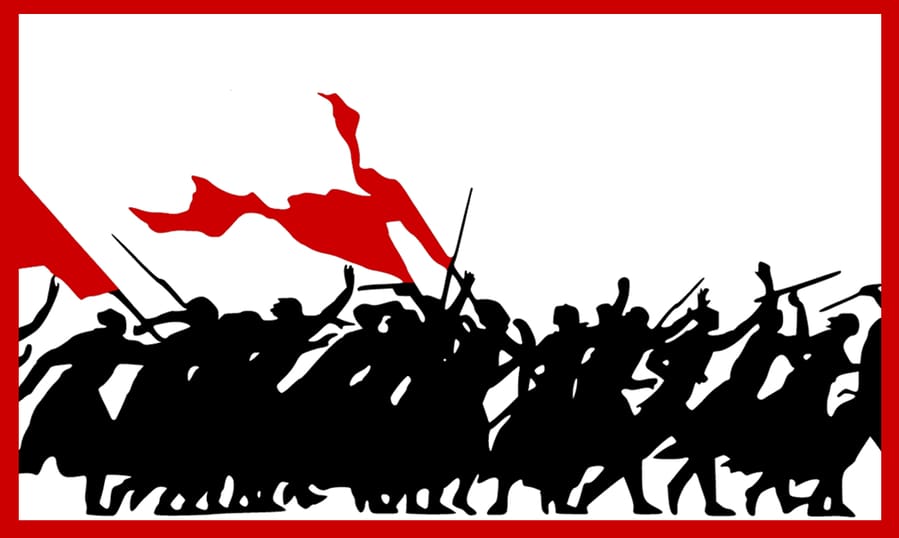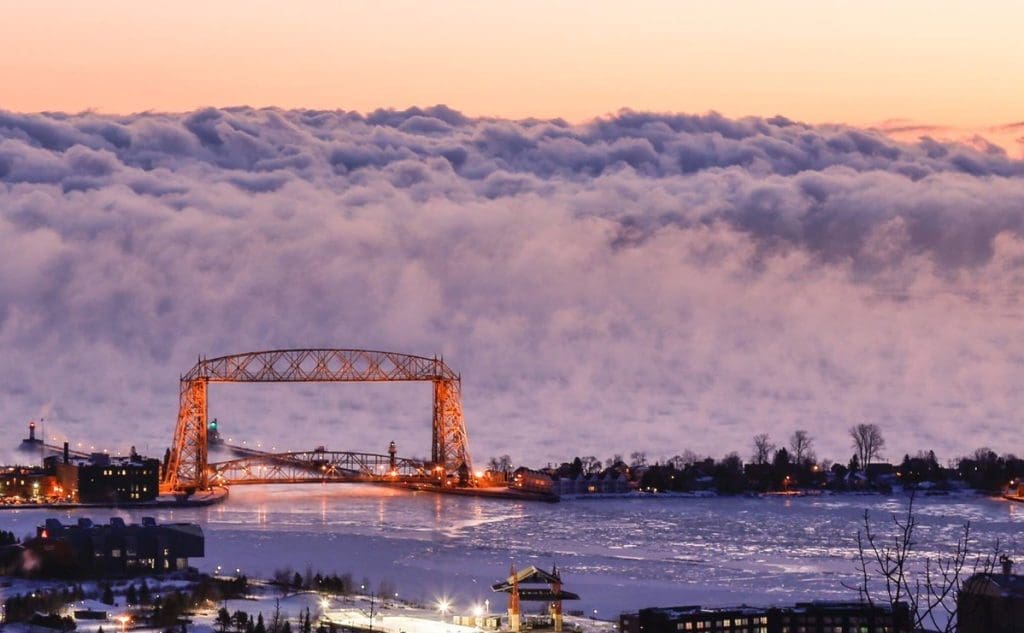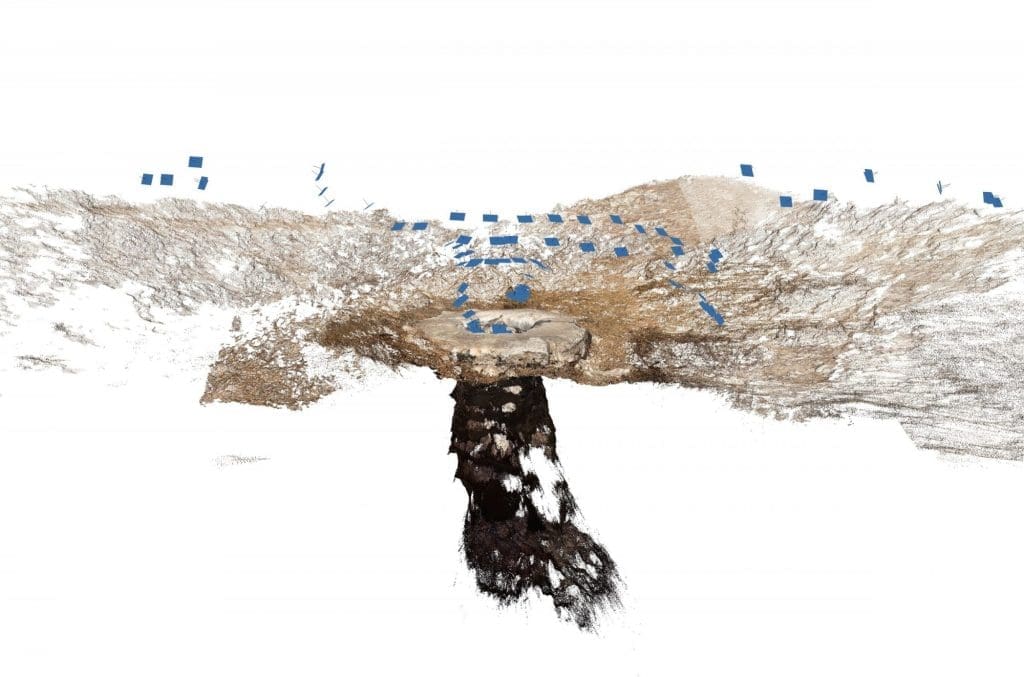Transcribed from the 7 January 2016 episode of This is Hell! Radio (Chicago) and printed with permission. Edited for space and readability. Listen to the whole episode:
The new São Paulo mayor dressed up like a street cleaner and appeared in public sweeping a broom, saying he was going to “clean up” by taking all the homeless people and street vendors off of the streets. What he’s talking about, though, is ethnic cleansing. Most homeless people, and most street vendors, are of indigenous or African descent.
Chuck Mertz: Post-coup, rightwing Brazil is as violent as post-election, rightwing US of A. Here to tell us about the fallout from the ouster of president Dilma Rousseff and who may have been behind the coup in the first place, Brian Mier is our correspondent in São Paulo and an editor at Brasil Wire, as well as a freelance writer and producer.
This week, Brian posted the Brasil Wire article “The US and Brazil’s coup of 2016.” He also has a book that he co-wrote with Cristiano Muller and Karla Moroso, the title of which translates to The Mega-Event: Sports in the City of Rio de Janeiro and the Right to the City; an Analysis of the Local Legal Framework.
Let’s start with the story that you sent us from December 29th of last year by architect and urban planner Luciana Itikawa, called “The Golpista Everyman and the Clean City: with far-right attitudes out of the closet, the post-Brexit UK and the post-Trump US both witnessed a surge in hate crime. Post-coup Brazil is no different.”
Here in the United States, CNN reported: “Fears of heightened bigotry and hate crimes have turned into reality for some Americans after Donald Trump’s presidential win, and the list of incidents keeps growing. The Southern Poverty Law Center counted 867 cases of hateful harassment or intimidation in the United States in the ten days after the election. The number of reported incidents declined almost every day from November 9th, the day after the election, to November 18th, but the incidents have been widespread, the Southern Poverty Law Center said, and the NYPD reported a huge spike in hate crimes since Trump’s election.”
What has been the experience of hate crime in Brazil since president Dilma Rousseff was removed from office on August 31st of last year?
Brian Mier: I don’t have exact numbers on that, but there’s a feeling that they’ve been on the increase, because just as Trump’s election has validated all kinds of hate rhetoric in the United States, the removal of the center-left PT government from office has validated all kinds of hate rhetoric in Brazil as well. Homophobia is on the rise. There are now people inside the congressional human rights committee who believe that homosexuality is an illness that can be cured.
The article I posted was about how on the 29th of December, two jiu-jitsu guys were trying to beat up a trans woman in a metro station in São Paulo, and a middle-aged street vendor tried to jump in a break it up, and he was beaten to death for trying to stop homophobic violence. That’s just an example. There are things like that happening all over the country.
CM: What has been the public reaction to this gentleman being killed for trying to protect a trans woman?
BM: I went to the protest honoring the guy, and they’re trying to name the subway station after him now, but a lot of people probably approved of his beating, because street vendors and homeless people are not considered fully human by a lot of people in the Brazilian middle class. By conservatives, they’re considered to be a kind of eyesore, a kind of garbage that has to be cleaned from the streets.
The metaphor of “cleaning things up” is being used by the new São Paulo mayor (who also was incidentally the star of the Brazilian franchise of Trump’s reality show The Apprentice here). The first thing he did when he took office was dress up like a street cleaner and appear in public sweeping a broom, saying he was going to “clean up” everything. He’s talking about taking all the homeless people and street vendors off of the streets.
What he’s talking about, though, is a kind of ethnic cleansing. Because most homeless people, and most street vendors, are of indigenous or African descent.
CM: Has he said where he wants these people to go? If he’s “cleaning” these people off the streets (and that’s a horrible, horrible phrase), where are they supposed to go? What is the next stage for their life?
BM: He’s one of these Growth Coalition mayors, like Daley was. It’s all about mega construction projects. So he’s talking about building a stadium or an enclosed space for all street vendors to gather—which screws up the concept of street vending, because street vendors occupy certain niches at certain points in the city where they can sell their products, like the tamale saleswoman in front of the 18th Street El station in Chicago: people going to work want to buy a tamale. If you pushed her into a big stadium or mall somewhere, people wouldn’t drive an hour to eat her tamales.
There’s a big music festival they have on the streets every year in São Paulo, and he’s talking about moving it into the Formula 1 stadium, two hours by public transportation from downtown. So his idea is just moving everyone off the streets into enclosed spaces, with no real plan about how he’s going to do that with homeless people.
CM: Luciana Itikawa writes: “His name was Ruas. Luis Carlos Ruas. He was a street vendor who worked in São Paulo for over 20 years. His nickname was “Indian.” Two men cruelly murdered him on Christmas night, 2016. They killed Ruas because he tried to stop violent aggression against a homosexual man and a trans woman. One of the criminals gave his motive (as if homophobia weren’t enough): that he was mad at his girlfriend.”
Are there people equivocating in their condemnation of this incident? Or even fanning the flames of this kind of hatred? How much anti-homosexual, racist rhetoric is there in Brazilian politics currently? Has it changed since you’ve been living in Brazil?
It’s a worldwide phenomenon, this rise of nationalism. Social media is very involved in creating this climate where people have become so reactionary, on all sides of the spectrum. It’s really a weird time right now.
BM: First of all, yes, there is equivocation. The police who reported the story said one of the attackers wasn’t in his right mind because he had just found out that his girlfriend had cheated on him. So the police were offering semi-apologies for the guy. And I don’t understand how they even found this information out, because the two attackers are still fugitives of justice. So why did the police bring that up to the media?
More broadly, there’s a huge fascist legacy left over from the military dictatorship. A lot of current elected officials, including the president, were government officials during the dictatorship. They got amnesty—unlike other countries (like Argentina, where they arrested a lot of the torturers and murderers from their dictatorship), they granted amnesty to everyone in Brazil, and a lot of those people have stayed in office. There has always been a strong far-right in Brazil.
It went a bit under the covers during the thirteen years of PT government. But some very far-right politicians like Jair Bolsonaro began to emerge—and hate-spreading evangelical politicians as well: a congressman named Marcos Feliciano (who is an advocate for the “cure” for homosexuality) ended up, in the last year of Dilma’s presidency, as president of the congressional human rights commission. He’s gone on record saying that black people are caused by a curse that’s mentioned in the Bible. And he’s part black. And he’s got a lot of followers.
You don’t see as much openly racist rhetoric in Brazil as you do in the United States, though. A lot of that is hidden behind class-related code words. Poor people. Northeasterners. Whatever. But they’re really talking about black people. The homophobic hate rhetoric and the rhetoric against poor people, though, is as high or higher than it is on the social media in the United States right now. Every time there’s some kind of hate crime, there are memes that come up on the internet making fun of it, making fun of the victims. Though I should add that a lot of this social media behavior seems to be coming from places outside of Brazil.
CM: Itikawa also writes in her Brasil Wire piece: “One of future São Paulo mayor João Doria’s measures is to exclude or expel peddlers and homeless people from the city streets. Doria, who called homeless people ‘indigents’ during his election campaign, says that he will remove all peddlers from the streets of São Paulo and put them in shopping malls. On December 20th, he said he will ‘fully remove’ both of these populations from the largest thoroughfares. He also created a controversy when he announced that he will remove the annual Virada Cultural music festival off of the downtown streets and into the Interlagos Formula 1 arena on the outskirts of the city where, ‘it will take place with security, without bothering the population.’”
How much do you fear São Paulo will change under Doria, and is São Paulo a microcosm of what will take place nationally with the new rightwing leadership?
BM: São Paulo has always had a very large rightwing middle class population, unlike other places in Brazil. São Paulo is known for its reactionary rightwing politicians. The governor, Geraldo Alckmin, has connections with Opus Dei, for example. There are a lot of far-right evangelical politicians as well.
And São Paulo is the kind of place that elects former death squad leaders. There are former leaders of the Rota, which is the special forces of the military police from the military dictatorship, who were effectively a legal death squad (and still conduct all kinds of death squad activities). They have an elected state congressman who brags about having killed 35 people. So in that sense, São Paulo (and the south and southeast of Brazil in general) has always had a more fascist element than the northeast. So São Paulo is not exactly a microcosm of the rest of Brazil.
On the other hand, it’s a huge part of Brazil’s economy, and the greater metropolitan area contains about ten percent of the country’s population. So a rise in the far right here affects the rest of the country. But in general, now, the left has been ostracized. The center-left government imploded; there doesn’t seem to be any expectation of a return.
CM: I want to ask you one more thing about the Itikawa article at Brasil Wire. She writes, “If the parliamentary coup of 2016 will be known as the liberation of all kinds of fascist ghost behavior and all kinds of additional coups against rights—labor, retirement, etc.—what will be left in 2017? If the rest of the rights and small differences become extinct, the only thing left will be the “Golpista Everyman.” The Golpista Everyman is the violent, intolerant, homophobic, misogynist, racist and authoritarian version of that common citizen who seemed to be incubating during 2016 and will gain the majority in 2017.”
Do you see the Golpista Everyman every day? Do you interact with people like that?
BM: I kind of try to avoid it. And I live on the periphery of São Paulo, where most people are working class—but I run into them. I have former in-laws who think that way. I see this stuff on Facebook all the time. And some people I’ve known for years have changed in the last year or two, becoming really reactionary and rightwing, in the same way I see with some of my old friends up in Chicago. Itikawa’s description of the Golpista Everyman, by the way, sounds a lot like a Trump supporter. I think it’s a worldwide phenomenon now, this rise of nationalism, and I don’t know what to do about it. Social media is very involved in creating this climate where people have become so reactionary, on all sides of the spectrum. It’s really a weird time right now.
There’s another spot in the article where Itikawa calls individual intolerant behavior a kind of “micro-coup.” I think it’s a nice metaphor, and that’s why I translated the article. And I do see this kind of behavior, sure. The attitudes have always been there, but it seems like last year’s coup legitimized it so that people feel comfortable talking about it now, whereas in the past they might have kept those feelings to themselves. Now they’re spamming it all over the internet and social media in a way that I also feel is similar to what’s happening in the United States with Trump’s election, and in Britain with the Brexit.
CM: You also posted an article at Brasil Wire on Thursday, with the headline, “The US and Brazil’s coup of 2016.” In it, you write, “During a recent visit to Porto Alegre, Cuban professor and writer Raúl Antonio Capote Fernández talked about a 20-year recruitment process that culminated in his direction of the CIA’s Project Genesis. The project aimed to cause a ‘soft coup’ using initiatives like creating a new Twitter-like platform to foster dissatisfaction with the government and NGO financing and training for artists, students, and professors to create a pseudo-left opposition party. Fernández said similar strategies were applied in Venezuela, Iran, and Libya, and continue to be implemented in many other countries around the developing world.
“He said a key soft-coup strategy is to weaken a government’s pillars until it implodes, to cause chaos. ‘With a country in chaos,’ he said, ‘it is possible to resort to more extreme methods.’ Fernández said that Genesis was modeled on Gene Sharpe’s theories on creating the soft coup.”
To what degree do you believe something like that may have happened in Brazil?
The US doesn’t like alternative economic systems. It wants to promote the image that neoliberal capitalism is the best system in the world. It doesn’t do good for the US’s image if there’s a country in the western hemisphere that has 100% free university education and where the minimum monthly retirement paycheck is equal to or above the minimum salary.
BM: Any intelligence analyst would say if you’re trying to discern the involvement of a government in some process that happened outside of its borders, first you ask how they would benefit from it. How would the US benefit from a coup in Brazil? And would this benefit outweigh any risk of being caught being involved in it?
In the article I talk about a few possible reasons that the US could benefit. I think they are very solid reasons. One is oil. Brazil has huge oil reserves that were, before the coup, fully controlled by the Brazilian people and the Brazilian government in a state company called Petrobras. Subsequently, they are selling off huge portions of their offshore reserves to petroleum multinationals at very low prices.
A second reason the US could benefit would be to weaken the BRICS bloc—Brazil, Russia, India, China, and South Africa—which was developing a more powerful economy than the United States. They were creating their own bank, the Development Bank, to rival the World Bank. From a hegemonic perspective, I don’t think the US was interested in seeing a thriving BRICS as a counterbalance to its power on the world stage.
Another reason is that the US always intervenes in Brazilian affairs: they would benefit from supporting this coup in Brazil in the same way they benefited in ’64 when they supported that coup. US businesses have an interest in keeping Brazilian commodity prices low and minimizing industrial production so there’s less competition for American products.
The final reason I gave that the US could benefit was what was happening before the coup: Brazil was the second-biggest economy and the second-biggest nation in the Western hemisphere. And it was running and thriving under a political economy that wasn’t fully neoliberal. It was a neo-developmentalist neoliberal economy offering alternative visions as an example for people around Latin America and in the world.
Again, the US doesn’t like alternative economic systems to its own system. It wants to promote the image that neoliberal capitalism is the best system in the world. It doesn’t do good for the US’s image if there’s a country in the western hemisphere that has 100% free university education, where the minimum monthly retirement paycheck is equal to or above the minimum salary (which isn’t the case in the US), and a whole bunch of other reasons that serve as positive examples that the US perhaps doesn’t want to thrive.
Those are a couple of reasons that the US could have intervened, if it did. Then I looked at possible ways it did. Taking for granted that this Cuban professor is telling the truth (for the sake of argument): did the US support new alternative-left political parties in Brazil? Its institutions certainly did—meaning the corporate media that upholds the US state as part of the expanded or integral US state, like the New York Times, or Time magazine. They heavily pumped up Green Party candidate Marina Silva in the 2010 and 2014 elections (in 2014 she ran on a different party ticket). There are a couple other very shady-seeming new pseudo-left parties that have popped up in Brazil in the last couple of years, too—Solidariedad, for example.
There’s a lot of other evidence on how the American press started shifting the narrative on Brazil to try and create a sense of chaos—which, as Fernández said, is integral to justifying intervention on the US’s part. Fernández says in Libya they created fake news stories to develop a sense of chaos, and they were trying to do it in Cuba in 2006 when Castro stepped down, though they ran into some problems.
Anyway, for about a year and a half, from 2013 on, there was a series of news stories in the US about chaos in Brazil. For months they were talking about how there was going to be huge riots during the World Cup, and they never happened. There were no riots. There was no protest related to the World Cup during the Cup that had more than a thousand people in it. Nevertheless, one example I give of how US media tried to promote a sense of chaos in Brazil in the lead up to regime change was the Vice USA documentary called Chaos in Brazil: On the Ground at the World Cup, which was literally about teachers’ strikes in Rio de Janeiro and São Paulo. It was about municipal teachers’ union strikes. But they gave it the title Chaos in Brazil and spread it all over the internet.
Then there’s the question of US interests supporting social network activity in Brazil. There was a conservative opposition presidential candidate who hired David Axelrod’s former PR firm to run all of its social media campaigns during the electoral period, and there are the Koch brothers pumping money into these new huge rightwing Facebook and Twitter accounts, called Movimento Brasil Livre and Estudantes da Verdade.
And the final way that the US could have intervened in the coup, if it did, was through economic destabilization. The US destabilized the Chilean economy in ’73 together with ITT corporation by causing a worldwide boycott on Chilean copper; in the lead up to the coup in Brazil, a judge named Sérgio Moro (who, according to leaked State Department cables, has been working with the American State Department on joint ventures to investigate money laundering crimes since at least 2009) froze the five largest construction companies in Brazil. He prohibited these construction companies from doing any work, causing the immediate layoff of 80,000 construction workers, and hundreds of thousands of indirect layoffs.
This move by Moro in the year leading to the coup caused a 6.7% decline in the entire construction sector. And we know, through these leaked State Department cables, that he’s been working with the United States.
I know this is a long answer to your question, but it’s a complicated question. What I’m trying to say is we don’t have enough concrete proof to make a completely convincing argument for US involvement, but if you look at the history of US involvement in Latin America since the Monroe Doctrine and all of the coups that it has supported—including in Honduras in 2009, Paraguay in 2011—I think it would be naive to argue that the US had nothing to do with this. It would be very naive.
CM: Within that context, then, Brian, how do you feel about the establishment media here in the US—especially with the New York Times and the Washington Post being so concerned about ‘fake news’ affecting the US presidential campaign?
Are strategies that the US may have used in the past to undermine and destabilize governments now coming back to bite them in the ass? Is the US experiencing blowback for screwing with others’ elections for so long?
BM: I’m not sure if what happened in the US elections was any different from any other US election. Is Russia trying to affect the US election? Of course. Just as the US tries to affect every Russian election, I’m sure Russia tries to affect every US election. I don’t think it’s any different than normal. What’s different is the way it’s being framed.
The Washington Post and the New York Times don’t have any ground to stand on when they start accusing other people of fake news. Is there fake news out there? Yes. But they participate in it as well, as they did with the Weapons of Mass Destruction garbage, and during the preparations for the destruction of Libya, which was the country in Africa with the highest standard of living at the time. And in the lead up to Vietnam; during the coup in 1964 in Brazil; during the coup in Chile in ’73. The Washington Post and New York Times have consistently generated fake news related to US foreign policy over the last several decades.
I think it’s funny the way American liberals seem to be turning on this whole idea now, though. If you bring up the idea that the Washington Post and New York Times generate fake news, then you’re attacked as being a conservative or something.
CM: Brian, it’s always a pleasure to hear your voice. Thank you so much for being part of the show.
BM: Thanks a lot, Chuck.
Featured image source: Mídia Ninja (Facebook)

